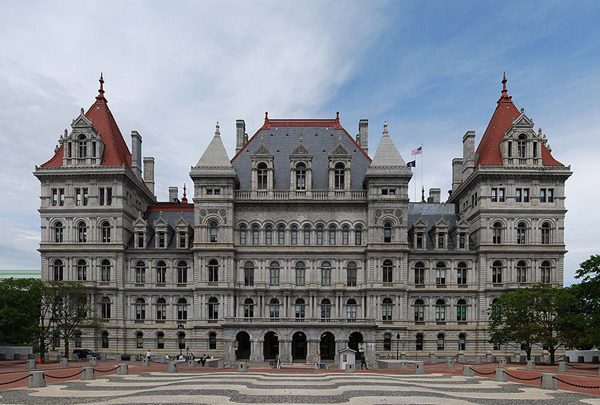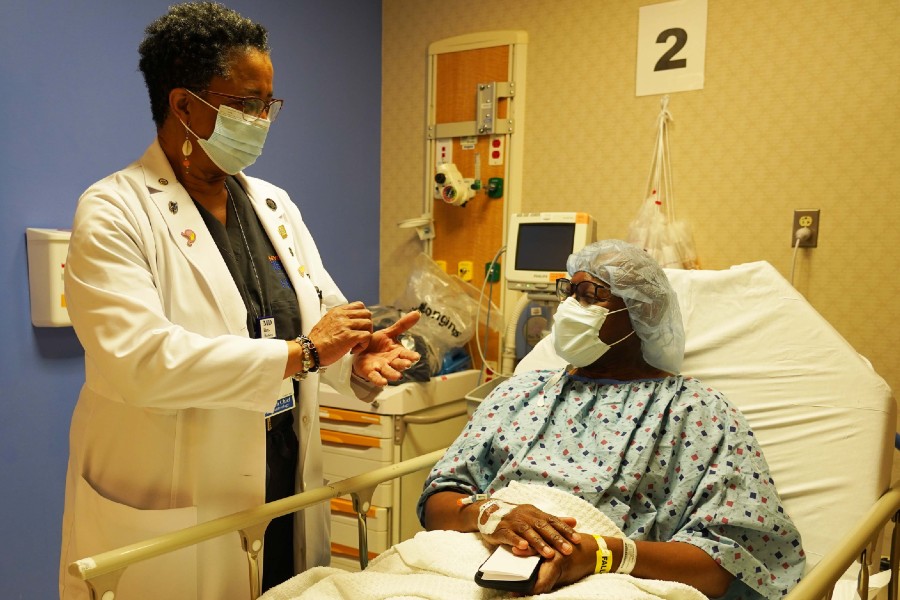 The Senate Democratic Majority today advanced legislation to close the racial disparities gap in healthcare, building on the conference’s continued work to protect the healthcare rights of all New Yorkers. This package will enact cultural education training for medical professionals, establish programs to recognize healthcare disparities, examine environmental effects of urban settings on public health, review changes in hospital services, and encourage equity in the addiction treatment services.
The Senate Democratic Majority today advanced legislation to close the racial disparities gap in healthcare, building on the conference’s continued work to protect the healthcare rights of all New Yorkers. This package will enact cultural education training for medical professionals, establish programs to recognize healthcare disparities, examine environmental effects of urban settings on public health, review changes in hospital services, and encourage equity in the addiction treatment services.
These bills will also enact an evaluation of ethnic disparities in infant mortality and breastfeeding to enhance the quality of healthcare services in New York and provide the necessary protections, and support these underserved communities’ needs.
“The Senate Democratic Majority is working aggressively to end the significant healthcare disparities in communities of color. This is only the start of addressing the systemic inequalities in the medical field,” Senate Majority Leader Andrea Stewart-Cousins said. “We will continue to break down the barriers in the healthcare sector that have led to severe implicit biases affecting diagnosis and care. Regardless of zip code, physical ability, gender, or race, everyone deserves equal access to quality treatment within the healthcare system. This legislation will not only alleviate the discriminatory obstacles minority New Yorkers face today, but it will also benefit the health and livelihood of our entire state.”
The legislation passed by the Senate Majority, include:
● Cultural Education for Medical Professionals: This bill S.1352 Sponsored by Senator Jose M. Serrano will require healthcare professionals to complete Continuing Medical Education courses in cultural awareness and competence training.
● Collaboration Programs to Address Healthcare Disparities: This bill This bill S.1374 sponsored by Senator James Sanders Jr. will authorize programs to work with hospitals, home care agencies and physicians to target health disparities thus improving health outcomes for under-served persons and reducing health care costs within the State.
● Health Equity Assessment For Certificate of Need Applications: This bill S.1451 sponsored by Senator Gustavo Rivera, will require a health equity assessment to be filed with an application for construction or change to a hospital or health related service, allowing consideration on how the project will impact medically underserved groups.
● Minority Coordinating Council on Asthmatic Affairs: This bill S.410A sponsored by Senator Alessandra Biaggi, establishes a minority coordinating council of asthmatic affairs to assess the asthma risk factors for minority citizens in NY, identify existing barriers to quality asthma treatment and care among minorities, develop action steps for addressing care issues, and launch a state-wide asthma awareness campaign.
○ Written in response to the death of Lydia Soto, a child from the South Bronx who passed away due to complications with asthma.
● Study of Asthma in Cities: This bill S.646A sponsored by Senator James Sanders Jr., directs the New York State Department of Health to conduct a study on the incidences of asthma in cities having a population of more than ninety thousand.
● Addiction Treatment Equity: This bill S.679A sponsored by Senator Pete Harckham, establishes the Council for Treatment Equity within the Office of Addiction Services and Supports to address substance use disorder treatment disparities among vulnerable populations across the state
● Study of Ethnic Disparities in Infant Mortality: This bill S.879 sponsored by Senator Brian Benjamin requires the Department of Health of the state of New York to conduct a study of the effects of racial and ethnic disparities on infant mortality and prepare and submit a report.
● Study of Ethnic Disparities in Breastfeeding: This bill S.1296 sponsored by Senator Brian Benjamin requires the Department of Health of the state of New York to conduct a review of the effects of racial and ethnic disparities on breastfeeding rates and prepare and submit a report.
Bill Sponsor and Chair of the Senate’s Health Committee, Senator Gustavo Rivera said, “Our healthcare system is in dire need of equity. By strengthening the criteria for changes in public health projects we can take into account how these projects will impact groups that have been medically underserved and overlooked for far too long. I am proud to sponsor legislation that adds transparency to our current system and builds trust within our communities.”
Bill Sponsor and Chair of the Senate Committee on Alcoholism and Substances Abuse, Senator Pete Harckham said, “There should be no hurdles or impediments for people with Substance Use Disorder when they need assistance—just sincere compassion and real help, I have introduced new legislation (S.679A) to create a council for treatment equity within the state’s Office of Addiction Services and Supports to ensure the best level of care is available to everyone in the state regardless of their race.”
Bill Sponsor, Senator Brian A. Benjamin said, “As New York works toward closing the gap on racial disparities in the healthcare system, it is vital that we examine the current detrimental health outcomes to help determine proper solutions. Therefore, I am proud to sponsor bills S.879 and S.1296 that will provide useful data as we fight to end the disproportionate amount of cases in infant mortality and improve the ability for women to breastfeed in underserved communities.”
Bill Sponsor, Senator Alessandra Biaggi said, “Lydia Soto was a young child from the South Bronx who, like so many, tragically passed away due to asthma complications. The South Bronx holds some of the highest asthma death rates in the country, disproportionately impacting children, communities of color, and low-income families. We must move with a sense of urgency to address this public health crisis, and the underlying conditions that made so many of our communities susceptible to the worst impacts of COVID. The purpose of Lydia Soto’s law is to create a Minority Coordinating Council on Asthmatic Affairs to address contributing factors, improve awareness and management of asthma prevention, and work to expand treatment services for communities of color across the state. I extend my deepest gratitude to Majority Leader Andrea Stewart Cousins for her support in moving this legislation forward.”
Bill Sponsor, Senator Kevin Parker said,“The pandemic has shown us that there is a need to improve access to health care services for ALL New Yorkers. The legislation that I sponsor will create a task force that will identify the barriers that prevent New Yorkers from accessing the much needed services and will provide solutions to help close this gap in order to create an equitable health care system in the state of New York. I want to thank Senate Majority Leader Andrea Stewart-Cousins for her leadership and for bringing this legislation to the floor.”
Bill Sponsor, Senator James Sanders Jr. said, “There are clear healthcare disparities in communities of color that need to be addressed. We see it right now with the disjointed distribution of the COVID-19 vaccine. Improving health outcomes for under-served persons reduces health care costs within the State, but beyond that, it is just the right thing to do. No one should be deprived of care, or given less or lower quality care because of their race or economic status. I have introduced two bills that would make health services more equitable. One directs the Department of Health to conduct an asthma study, while the other will authorize programs to work with hospitals, home care agencies and physicians to target health disparities.”
Bill Sponsor, Senator Jose M. Serrano said, “Even before the COVID-19 crisis highlighted the deep inequalities in our society, there was ample evidence that minority groups face glaring disparities in access to quality healthcare. I’m proud that my bill to ensure medical professionals receive thorough training on culturally sensitive care is included in this important package. As one of the most diverse states in the nation, New York should lead the way in providing everyone— regardless of race, English proficiency, sexual orientation, or disability— with quality healthcare they can trust.”
Senate Deputy Leader Michael Gianaris said, “The pandemic put into glaring focus the disparities in access to healthcare and outcomes for communities of color. The measures we are passing in the Senate are a first step in the change we need to improve the health of our fellow New Yorkers.”
Senator Jamaal Bailey said, “Sadly, in the year 2021, there are still glaring inequities in health care in our state that are noticeable every day. There is no recent better example of the inequities when we examine the manner in which COVID-19 exposed the level of health disparities within our state. COVID had a devastating effect on communities of color, largely in part due to the steep disparities related to pre-existing health conditions that existed prior to the pandemic. Generational lack of access to quality healthcare coupled with environmental racism have created a recipe for disaster. Now as we begin to recover from the pandemic, we must focus on rebuilding and reimagining the way we look at health care. This health disparities package the Majority is putting forward is necessary and paramount to improve the lives of our residents and begin to redefine what healthcare means in New York. I would like to thank Majority Leader Andrea Stewart-Cousins, Health Committee Chair Senator Gustavo Rivera, and my colleagues who sponsored these essential pieces of legislation.”
Senator Samra Brouk said, “All families deserve the security and peace of mind that comes with knowing their healthcare needs will be met. The COVID-19 pandemic has shined a light on the gross inequities that we knew already existed in our healthcare system. I’m happy to support this package of legislation that promotes racial equity. Better public health policies and programs are needed to address the structural, system-wide inequities that exist in our healthcare system and to address the difficulty many of us face in getting access to culturally competent care.”
Senator Michelle Hinchey said, “COVID-19 did not create the severe and pervasive problems in our healthcare system, but it further exposed them in a way that can no longer be ignored. Communities of color and rural residents living in our medically-underserved areas suffer disproportionately from provider shortages and limited access to specialized services, including mental health and detox assistance. Among the bills advanced today by the State Senate are two I am proud to co-sponsor that will address substance use disorder treatment disparities and require hospitals to submit health equity assessments for state approval when expanding or reducing care capacity in the communities they serve. These issues demand our attention.”
Senator Brad Hoylman said, “The COVID-19 pandemic has exacerbated existing inequities in health care in devastating ways. We owe it to New York’s underserved populations to analyze how we have failed to properly serve their communities in health care spaces and then work to shrink gaps in health literacy and access. I’m proud to be part of the Senate Democratic Conference passing these bills that tackle these inequities by studying asthma in cities, adding an equity assessment for changes to hospitals or health services, and creating a council for equity in addiction treatment. I’m grateful to Senate Majority Leader Andrea Stewart-Cousins and all of my Senate colleagues for their focus on improving health care in New York.”
Senator Robert Jackson said, “In May 2020 I had the honor of chairing a joint legislative hearing on the disparate impacts of COVID-19 on minorities in New York State. Even at that early stage, the devastating disproportionate impact of the pandemic—especially in Black and Latinx communities like the ones I represent in Northern Manhattan—had become clear. This package of bills addresses these and other long-standing findings of racism within our public health system. I am proud to be part of a Senate Majority that is addressing these issues head-on with progressive legislation. And now, in the wake of this pandemic, we have an opportunity to win big in our fight for health justice, providing the healthcare access all New Yorkers deserve.”
Senator Anna M. Kaplan said, “The COVID pandemic has exposed and exacerbated many of the inequities that minority New Yorkers face every day, particularly around disparities in healthcare. The bills being passed by the Senate Majority today will begin to address these disparities and work towards more equitable access to healthcare services for all New Yorkers.”
Senator Liz Krueger said, “Increasing healthcare access is not just about removing cost barriers; it also requires confronting the broader inequalities and fault lines that lead to disparities in outcomes for New Yorkers across the board. This package of bills takes important steps on the path toward understanding and addressing why we are failing to provide appropriate care to far too many of our neighbors. I’m proud to stand with my Majority colleagues in saying that it’s time for our healthcare system to work for all New Yorkers.”
Senator Rachel May said, “The pandemic has highlighted the stark disparities that exist in our communities, but one of the most tragic is access to quality and equitable healthcare. I am proud to support this package of legislation to tackle some of these major issues, and will continue to work to make New York a place where everyone has access to the healthcare they deserve.”
Senator Zellnor Myrie Said, “The pandemic has exposed what many of us have known all along– New Yorkers of color face undeniable, longstanding disparities in access to quality healthcare. My Senate Majority colleagues and I are addressing these disparities head-on, and I look forward to further legislative action that will improve access to care for my constituents.”
Senator Roxanne J. Persaud said, “Access to an adequate healthcare system is a necessity and should be equally affordable to everyone. Every year, minority communities continue to receive inadequate medical care. The package of legislation will help the state to improve healthcare disparities. I thank Senator Serrano, Parker, Rivera, Biaggi, Sanders, Hackam, and Benjamin for sponsoring legislation that seeks to improve the healthcare disparities that minorities face while navigating our healthcare system.
Senator Elijah Reichlin-Melnick said, “Honoring Black History on the first day of Black History Month is about more than just sharing a social media post. That’s why I am proud to support this package of bills to take steps towards eliminating systemic discrimination and implicit bias in our healthcare system.”
Senator Luis Sepúlveda said, “As we have seen during the COVID-19 pandemic, low-income and communities of color are suffering and experiencing the devastating impact of significant health disparities. They have lacked quality and affordable health care and disproportionately borne the brunt of this virus, especially in my district in the Bronx. With advancing today’s package of legislation, we are building an equitable health care system that examines health disparities explicitly in health care costs, infant mortality rates, asthma risk factors in minorities, substance use disorder treatments in vulnerable populations, and much more so that we can improve access, cultural awareness and prevent worse health outcomes for socioeconomic disadvantaged and underserved communities.“
Senator Kevin Thomas said, “The COVID-19 pandemic continues to underscore the deep inequities in our health care system, and has especially devastated our underserved communities. The time is now to build a healthier, more equitable future. I am proud to support this comprehensive package of legislation to address systemic inequalities in our health system so that all communities in New York can thrive.”
New York ranks 30th out of 50 states in its maternal death rates, an issue that has amplified the racial and ethnic health disparities in the state. The number of reported maternal mortalities in New York increased over time from 15.4 deaths per 100,000 live births in 2001-2003 to 19.6 deaths per 100,000 live births in 2014-2016. The United States rate more than doubled during this time.The number for maternal mortality for women of color, especially for Black women, is even higher. In 2019, the Senate Democratic Majority enacted the Maternal Mortality Review Board to hear from those directly impacted and make recommendations to address and create new strategies to combat this crisis head-on.
Become a Harlem Insider!
By submitting this form, you are consenting to receive marketing emails from: Harlem World Magazine, 2521 1/2 west 42nd street, Los Angeles, CA, 90008, https://www.harlemworldmagazine.com. You can revoke your consent to receive emails at any time by using the SafeUnsubscribe® link, found at the bottom of every email. Emails are serviced by Constant Contact








